商业伦理 英文版
- 格式:ppt
- 大小:1.31 MB
- 文档页数:63
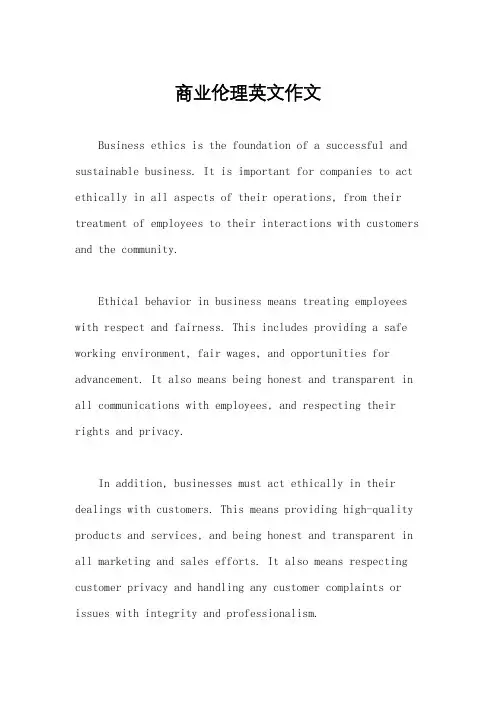
商业伦理英文作文Business ethics is the foundation of a successful and sustainable business. It is important for companies to act ethically in all aspects of their operations, from their treatment of employees to their interactions with customers and the community.Ethical behavior in business means treating employees with respect and fairness. This includes providing a safe working environment, fair wages, and opportunities for advancement. It also means being honest and transparent in all communications with employees, and respecting their rights and privacy.In addition, businesses must act ethically in their dealings with customers. This means providing high-quality products and services, and being honest and transparent in all marketing and sales efforts. It also means respecting customer privacy and handling any customer complaints or issues with integrity and professionalism.Furthermore, businesses have a responsibility to act ethically in their interactions with the community and the environment. This includes being good corporate citizens, supporting local charities and initiatives, and minimizing their impact on the environment through sustainable business practices.Finally, business ethics also extends to the way companies interact with their competitors and the larger industry. This means avoiding unfair or anti-competitive practices, and instead focusing on healthy competition and collaboration for the greater good of the industry and the consumers.In conclusion, business ethics is essential for the long-term success and sustainability of any company. By treating employees, customers, the community, and the environment with respect and integrity, businesses canbuild a strong reputation and earn the trust and loyalty of their stakeholders.。
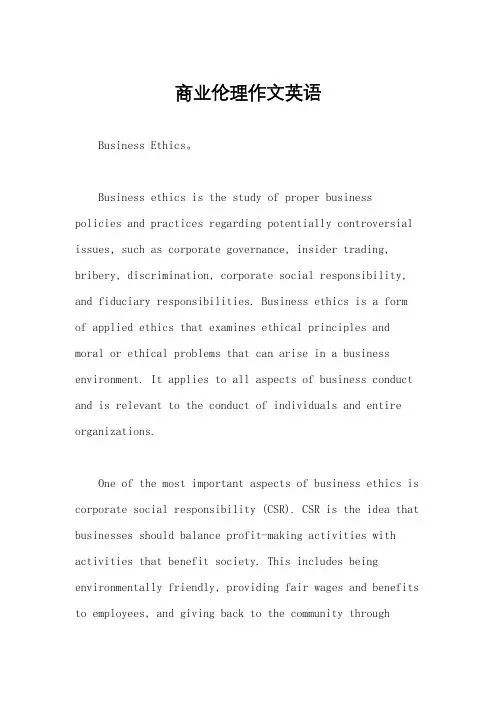
商业伦理作文英语Business Ethics。
Business ethics is the study of proper businesspolicies and practices regarding potentially controversial issues, such as corporate governance, insider trading, bribery, discrimination, corporate social responsibility, and fiduciary responsibilities. Business ethics is a form of applied ethics that examines ethical principles and moral or ethical problems that can arise in a business environment. It applies to all aspects of business conduct and is relevant to the conduct of individuals and entire organizations.One of the most important aspects of business ethics is corporate social responsibility (CSR). CSR is the idea that businesses should balance profit-making activities with activities that benefit society. This includes being environmentally friendly, providing fair wages and benefits to employees, and giving back to the community throughphilanthropic activities. Many companies today are judged not just on their financial performance, but also on how they contribute to society and the environment.Another important aspect of business ethics is the treatment of employees. It is important for businesses to treat their employees fairly and with respect. This means providing fair wages, safe working conditions, and opportunities for advancement. It also means not discriminating against employees based on factors such as race, gender, or sexual orientation.In addition to the treatment of employees, businesses also have a responsibility to their customers. This includes providing high-quality products and services, being honest in advertising and sales practices, and respecting customer privacy. Businesses should also strive to resolve customer complaints and issues in a fair and timely manner.Business ethics also extends to the relationships businesses have with their suppliers and partners. It isimportant for businesses to be honest and fair in their dealings with suppliers, and to ensure that their partners and collaborators adhere to the same ethical standards.Finally, business ethics also encompasses the behaviorof individuals within the organization. This includes avoiding conflicts of interest, maintaining confidentiality, and not engaging in insider trading or other unethical financial practices.In conclusion, business ethics is an important aspectof running a successful business. By adhering to ethical principles and practices, businesses can build trust with their stakeholders, including customers, employees, and the community. This can lead to long-term success and sustainability for the business, as well as a positive impact on society as a whole.Business Ethics in Action: The Case of Patagonia。

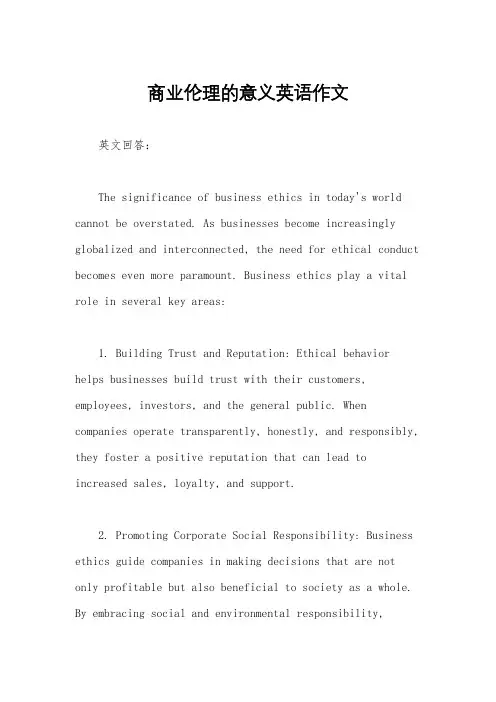
商业伦理的意义英语作文英文回答:The significance of business ethics in today's world cannot be overstated. As businesses become increasingly globalized and interconnected, the need for ethical conduct becomes even more paramount. Business ethics play a vital role in several key areas:1. Building Trust and Reputation: Ethical behavior helps businesses build trust with their customers, employees, investors, and the general public. When companies operate transparently, honestly, and responsibly, they foster a positive reputation that can lead to increased sales, loyalty, and support.2. Promoting Corporate Social Responsibility: Business ethics guide companies in making decisions that are not only profitable but also beneficial to society as a whole. By embracing social and environmental responsibility,businesses can contribute positively to their communities and build a sustainable future.3. Encouraging Innovation and Creativity: Ethical practices create a conducive environment for innovation and creativity. When employees feel valued and respected, they are more likely to take risks, think outside the box, and come up with new ideas that can drive business growth.4. Preventing Unethical Behavior: Business ethics provide a framework for making ethical decisions and preventing unethical behavior. By establishing clear guidelines and expectations, companies can deter employees from engaging in corrupt, fraudulent, or illegal activities that can damage the organization and its stakeholders.5. Maintaining Legal Compliance: Ethical conduct helps businesses comply with laws and regulations. By adhering to ethical standards, companies can avoid legal penalties, fines, and reputational damage that can result from unethical practices.中文回答:商业伦理在当今世界中的意义不言而喻。

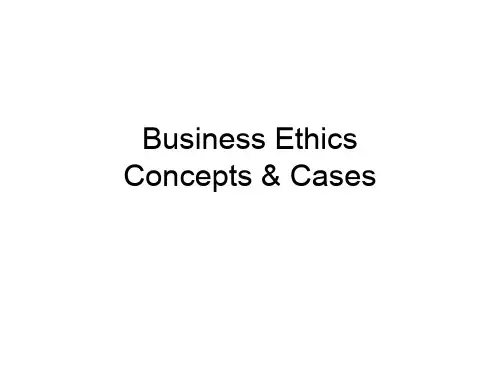

"商业伦理的重要性英文作文"The Importance of Business EthicsHave you ever wondered why some businesses thrive while others crash and burn? Well, let me tell you, it often comes down to business ethics.I once had a personal experience that really drove this point home. A few years ago, I was working for a small startup. We were a team of passionate individuals, all eager to make our mark in the market. The company was doing well initially, but then things started to go south.Our boss, let's call him Mr. Smith, was always looking for shortcuts to increase profits. He started cutting corners on the quality of our products to save costs. One day, I remember clearly, I was in a meeting with him and a few of my colleagues."Guys," Mr. Smith said, "we need to cut back on the materials we use. It'll save us a bunch of money and we can still sell at the same price.""But sir," I piped up, "won't that affect the quality? Customers might notice.""Nah," he replied dismissively, "they won't know the difference. It's all about the bottom line."Well, as you can imagine, it wasn't long before customers started complaining. Word spread fast and our sales plummeted. My colleagues and I were frustrated. We knew this wasn't the right way to do business.One of my co-workers, Mary, confronted Mr. Smith again. "We can't keep doing this, boss. We're losing our reputation."But Mr. Smith wouldn't listen. Eventually, the company went bankrupt and we all lost our jobs.This experience taught me a valuable lesson. Business ethics is not just some fancy term; it's crucial for the success of any business. When you treat your customers fairly, provide quality products or services, and act with integrity, you build trust. And trust is what keeps customers coming back and helps your business grow.So, the next time you think about making a decision in your business, remember Mr. Smith's mistakes and do the right thing. Because in the longrun, good ethics always pays off.。
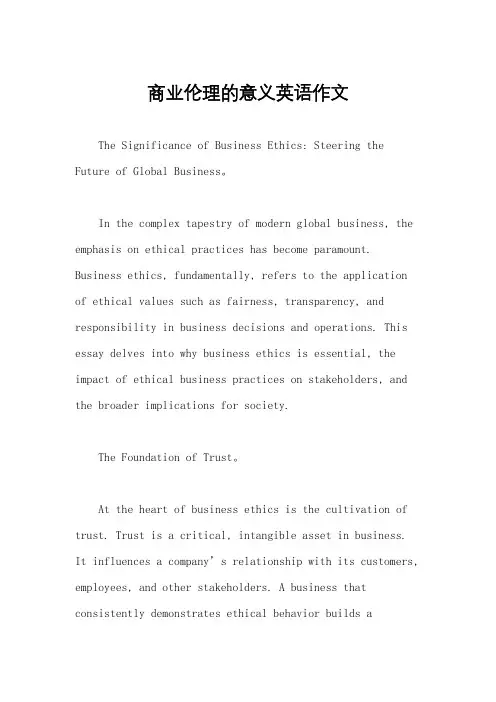
商业伦理的意义英语作文The Significance of Business Ethics: Steering the Future of Global Business。
In the complex tapestry of modern global business, the emphasis on ethical practices has become paramount. Business ethics, fundamentally, refers to the application of ethical values such as fairness, transparency, and responsibility in business decisions and operations. This essay delves into why business ethics is essential, the impact of ethical business practices on stakeholders, and the broader implications for society.The Foundation of Trust。
At the heart of business ethics is the cultivation of trust. Trust is a critical, intangible asset in business. It influences a company’s relationship with its customers, employees, and other stakeholders. A business that consistently demonstrates ethical behavior builds areputation of reliability and integrity, making it more attractive to customers and business partners. Conversely, ethical lapses can lead to mistrust and long-term damage to a company’s reputation. For instance, the Volkswagen emissions scandal in 2015, where the company was found to have cheated on emissions tests, not only led to billionsin fines but also a significant loss of consumer trust worldwide.Impact on Employees。
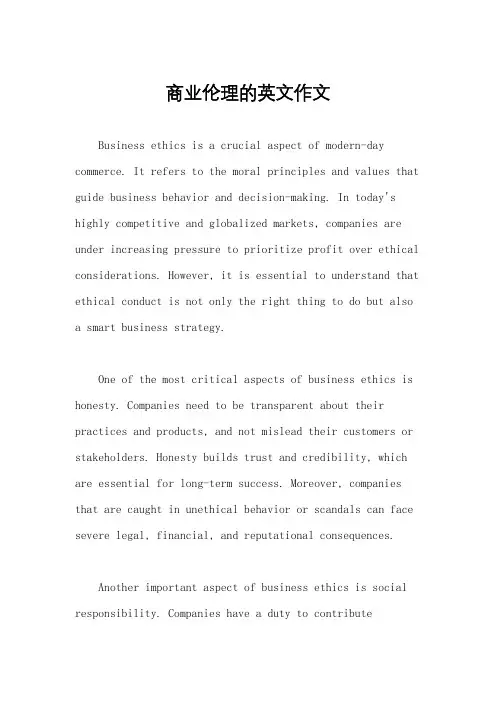
商业伦理的英文作文Business ethics is a crucial aspect of modern-day commerce. It refers to the moral principles and values that guide business behavior and decision-making. In today's highly competitive and globalized markets, companies are under increasing pressure to prioritize profit over ethical considerations. However, it is essential to understand that ethical conduct is not only the right thing to do but also a smart business strategy.One of the most critical aspects of business ethics is honesty. Companies need to be transparent about their practices and products, and not mislead their customers or stakeholders. Honesty builds trust and credibility, which are essential for long-term success. Moreover, companies that are caught in unethical behavior or scandals can face severe legal, financial, and reputational consequences.Another important aspect of business ethics is social responsibility. Companies have a duty to contributepositively to society and the environment, beyond their financial goals. They should consider the impact of their operations on the community, the environment, and the economy. Companies that prioritize social responsibility can benefit from enhanced brand reputation, customer loyalty, and employee satisfaction.Fairness and justice are also crucial aspects of business ethics. Companies should treat all stakeholders fairly and equitably, without discrimination or bias. This includes employees, customers, suppliers, and shareholders. Fairness and justice build a positive workplace culture, foster employee engagement, and enhance customer satisfaction and loyalty.Finally, ethical leadership is essential for promoting and sustaining business ethics. Leaders should set the tone for ethical conduct, lead by example, and create a culture of integrity and accountability. Ethical leadership can inspire employees to act ethically, enhance stakeholder trust, and drive long-term business success.In conclusion, business ethics is a vital aspect of modern-day commerce. It involves honesty, social responsibility, fairness and justice, and ethical leadership. Companies that prioritize ethical conduct can benefit from enhanced reputation, customer loyalty, and long-term success.。
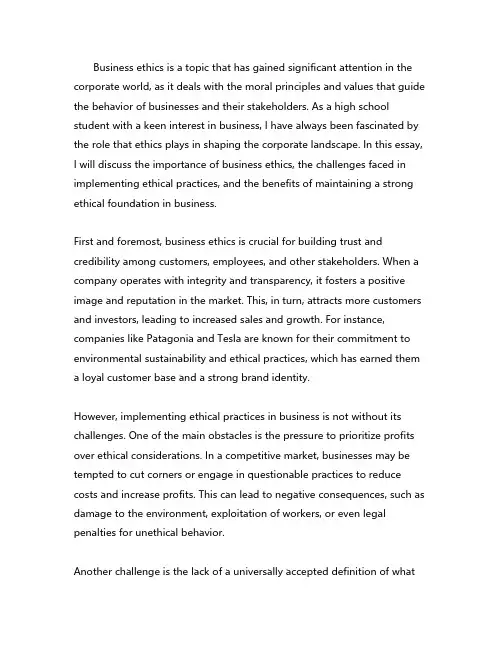
Business ethics is a topic that has gained significant attention in the corporate world, as it deals with the moral principles and values that guide the behavior of businesses and their stakeholders. As a high school student with a keen interest in business, I have always been fascinated by the role that ethics plays in shaping the corporate landscape. In this essay, I will discuss the importance of business ethics, the challenges faced in implementing ethical practices, and the benefits of maintaining a strong ethical foundation in business.First and foremost, business ethics is crucial for building trust and credibility among customers, employees, and other stakeholders. When a company operates with integrity and transparency, it fosters a positive image and reputation in the market. This, in turn, attracts more customers and investors, leading to increased sales and growth. For instance, companies like Patagonia and Tesla are known for their commitment to environmental sustainability and ethical practices, which has earned them a loyal customer base and a strong brand identity.However, implementing ethical practices in business is not without its challenges. One of the main obstacles is the pressure to prioritize profits over ethical considerations. In a competitive market, businesses may be tempted to cut corners or engage in questionable practices to reduce costs and increase profits. This can lead to negative consequences, such as damage to the environment, exploitation of workers, or even legal penalties for unethical behavior.Another challenge is the lack of a universally accepted definition of whatconstitutes ethical behavior in business. Different cultures, industries, and individuals may have varying perspectives on what is considered right or wrong. This can create confusion and disagreements within a company, making it difficult to establish a consistent ethical framework.Despite these challenges, there are numerous benefits to maintaining a strong ethical foundation in business. For one, ethical practices can lead to longterm success and sustainability. Companies that prioritize ethical behavior are more likely to build lasting relationships with customers, employees, and partners, creating a stable and loyal base for growth. Additionally, ethical businesses are more likely to attract top talent, as employees value working for a company that aligns with their personal values and principles.Moreover, adhering to ethical standards can also result in cost savings and reduced legal risks. By avoiding unethical practices, businesses can prevent potential fines, lawsuits, and damage to their reputation. For example, the Volkswagen emissions scandal in 2015 resulted in billions of dollars in fines and a significant loss of consumer trust, demonstrating the high cost of unethical behavior.To effectively implement business ethics, companies must establish a clear code of conduct and ethical guidelines that are communicated to all employees. This includes setting expectations for behavior, providing training and resources, and creating a system for reporting and addressing ethical concerns. It is also important for leaders to model ethical behavior and demonstrate a commitment to ethical values in their decisionmakingand actions.In conclusion, business ethics plays a vital role in shaping the corporate landscape and ensuring longterm success. While there are challenges in implementing ethical practices, the benefits of maintaining a strong ethical foundation far outweigh the costs. By prioritizing integrity, transparency, and fairness, businesses can build trust, attract top talent, and achieve sustainable growth. As a high school student, I am inspired by the potential for ethical practices to create a better future for both businesses and society as a whole.。
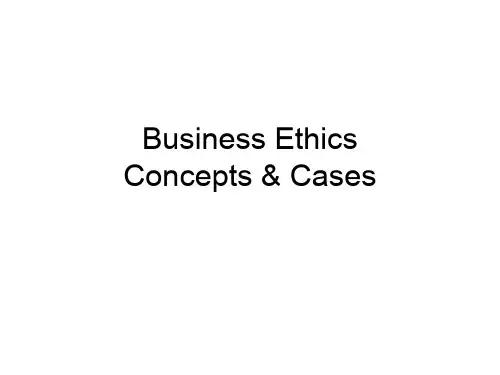
商业伦理作文英语模板英文回答:Business Ethics Essay Template。
Introduction。
Thesis statement: State the main argument or claim of your essay.Body Paragraphs。
Topic sentence: Introduce each ethical issue or concern you will discuss.Explanation: Explain the issue in detail, including examples and evidence.Ethical analysis: Analyze the ethical implications of the issue, using ethical theories or principles.Impact: Discuss the potential impact of the issue on stakeholders or society as a whole.Possible solutions: Suggest possible solutions to the issue and discuss their potential pros and cons.Conclusion。
Restate thesis statement: Briefly summarize your main argument or claim.Summarize key points: Remind readers of the key ethical issues and concerns you discussed.Call to action: Offer recommendations or suggestions for addressing the ethical concerns.中文回答:商业伦理论文模板。
BUSINESS ETHICSWhat does "Business Ethics" mean? What is the importance of ethics in business? Business Ethics is not personality, though a good personality is an asset, it is not sufficient. It is the primary, the element of successful business. Don't let a clever mind and sinuous practice undermine your character. Business Ethics is what other people can depend upon, what you are likely to do. Nowadays, more and more attention has been paid to the business ethics.Center business principles: honesty is a prerequisite for development. Your success in business requires the trust of other people. Good character is your key to success. Nowadays, the slip of ethics and the absence of social responsibility, especially integrity crisis in business field seriously influenced the development of society. The phenomenon of the trust imperfection is seen everywhere, giving the society and the nation a lot of loses in many ways, and you can’t cheat your customers forever and get away with it, you cannot always be a profit. So, I think no matter what you do, as long as you are in business, we should think of business is a matter of integrity, which is very important.Many people know the importance of business ethics, but there are still many people not to abide by it. We often find the media reports the credit problems in business, such as add some harmful material into the products. These behaviors cause much great damage to consumers, they spent money but not get good commodities, especially these commodities harm their health. This is difficult for people to forget that some children eat not safe milk powder, their health suffered serious damage . People can't stand this kind of behavior, which harms people's physical health and social development forward. Also, the company must face collapse, and the related personnel will be punished by the law .Business ethics is the key to success in future business world,。
商业伦理学英语作文带翻译Business Ethics。
Business ethics is a subject that has been gaining more and more attention in recent years. It is the study of how businesses should behave in a moral and ethical way. In other words, it is the study of what is right and wrong in the business world.There are many different areas of business ethics that are studied. One of the most important is corporate social responsibility. This is the idea that businesses have a responsibility to society as a whole, not just to their shareholders. Businesses should be aware of the impact that their actions have on the environment, their employees, and the communities in which they operate.Another important area of business ethics is ethical leadership. This is the idea that leaders in business should act in a way that is ethical and sets a good examplefor others. They should be honest, transparent, and fair in their dealings with employees, customers, and other stakeholders.One of the biggest challenges in business ethics is balancing the interests of different stakeholders. For example, a company may need to make a decision that is good for its shareholders, but bad for its employees. In these situations, it is important for businesses to consider the impact of their decisions on all stakeholders and to try to find a solution that is fair to everyone.There are many benefits to practicing good business ethics. For example, businesses that act in an ethical way are more likely to attract and retain customers, as well as employees who are committed to the company's values. They are also more likely to have a positive reputation in the community and to avoid legal and regulatory problems.In conclusion, business ethics is an important subject that all businesses should take seriously. By acting in an ethical way, businesses can benefit themselves, theirstakeholders, and society as a whole.商业伦理学。
商业伦理的英文作文下载温馨提示:该文档是我店铺精心编制而成,希望大家下载以后,能够帮助大家解决实际的问题。
文档下载后可定制随意修改,请根据实际需要进行相应的调整和使用,谢谢!并且,本店铺为大家提供各种各样类型的实用资料,如教育随笔、日记赏析、句子摘抄、古诗大全、经典美文、话题作文、工作总结、词语解析、文案摘录、其他资料等等,如想了解不同资料格式和写法,敬请关注!Download tips: This document is carefully compiled by theeditor. I hope that after you download them,they can help yousolve practical problems. The document can be customized andmodified after downloading,please adjust and use it according toactual needs, thank you!In addition, our shop provides you with various types ofpractical materials,such as educational essays, diaryappreciation,sentence excerpts,ancient poems,classic articles,topic composition,work summary,word parsing,copyexcerpts,other materials and so on,want to know different data formats andwriting methods,please pay attention!Business ethics is the moral principles and values that guide the behavior of individuals and organizations in the business world. It is important for businesses to operate ethically in order to maintain their reputation and build trust with their customers, employees, and the community.Ethical behavior in business includes being honest and transparent in all dealings, treating employees and customers with respect and fairness, and being environmentally and socially responsible. When businesses act ethically, they are more likely to attract and retain loyal customers, as well as talented and motivated employees.However, in the pursuit of profit, some businesses may be tempted to cut corners or engage in unethical behavior. This can lead to negative consequences such as legal trouble, damage to reputation, and loss of trust from stakeholders. Therefore, it is crucial for businesses toprioritize ethical behavior and hold themselves accountable for their actions.In today's interconnected world, businesses are increasingly being held accountable for their actions by consumers, employees, and the public. Social media and other forms of communication make it easier for unethical behavior to be exposed and for businesses to face consequences for their actions. Therefore, it is in the best interest of businesses to prioritize ethics and integrity in all aspects of their operations.In conclusion, business ethics is essential for the long-term success and sustainability of any organization. By prioritizing ethical behavior, businesses can buildtrust with their stakeholders and contribute to a more positive and sustainable business environment. It is important for businesses to continuously evaluate and improve their ethical practices in order to create a positive impact on society and the world.。